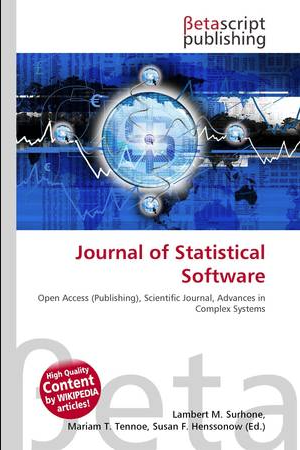Sequential Monte Carlo Methods in the nimble and nimbleSMC R Packages
IF 8.1
2区 计算机科学
Q1 COMPUTER SCIENCE, INTERDISCIPLINARY APPLICATIONS
引用次数: 3
Abstract
nimble is an R package for constructing algorithms and conducting inference on hierarchical models. The nimble package provides a unique combination of flexible model specification and the ability to program model-generic algorithms. Specifically, the package allows users to code models in the BUGS language, and it allows users to write algorithms that can be applied to any appropriate model. In this paper, we introduce the nimbleSMC R package. nimbleSMC contains algorithms for state-space model analysis using sequential Monte Carlo (SMC) techniques that are built using nimble . We first provide an overview of state-space models and commonly-used SMC algorithms. We then describe how to build a state-space model in nimble and conduct inference using existing SMC algorithms within nimbleSMC . SMC algorithms within nimbleSMC currently include the bootstrap filter, auxiliary particle filter, ensemble Kalman filter, IF2 method of iterated filtering, and a particle Markov chain Monte Carlo (MCMC) sampler. These algorithms can be run in R or compiled into C++ for more efficient execution. Examples of applying SMC algorithms to linear autoregressive models and a stochastic volatility model are provided. Finally, we give an overview of how model-generic algorithms are coded within nimble by providing code for a simple SMC algorithm. This illustrates how users can easily extend nimble’s SMC methods in high-level code.灵活的esmc R包中的顺序蒙特卡罗方法
nimble是一个R包,用于构造算法和对层次模型进行推理。灵活的软件包提供了灵活的模型规范和编程模型通用算法的能力的独特组合。具体地说,这个包允许用户用BUGS语言编写模型,并且允许用户编写可应用于任何适当模型的算法。在本文中,我们介绍了灵活的esmc R包。nimbleSMC包含使用顺序蒙特卡罗(SMC)技术进行状态空间模型分析的算法,该技术是使用nimble构建的。我们首先概述了状态空间模型和常用的SMC算法。然后,我们描述了如何在nimble中构建状态空间模型,并在nimbleSMC中使用现有的SMC算法进行推理。nimbleSMC中的SMC算法目前包括自举滤波、辅助粒子滤波、集成卡尔曼滤波、IF2迭代滤波方法和粒子马尔可夫链蒙特卡罗(MCMC)采样器。这些算法可以在R中运行或编译成c++以提高执行效率。给出了将SMC算法应用于线性自回归模型和随机波动模型的实例。最后,我们通过提供一个简单的SMC算法的代码,概述了如何在敏捷中编码模型泛型算法。这说明了用户如何在高级代码中轻松扩展nimble的SMC方法。
本文章由计算机程序翻译,如有差异,请以英文原文为准。
求助全文
约1分钟内获得全文
求助全文
来源期刊

Journal of Statistical Software
工程技术-计算机:跨学科应用
CiteScore
10.70
自引率
1.70%
发文量
40
审稿时长
6-12 weeks
期刊介绍:
The Journal of Statistical Software (JSS) publishes open-source software and corresponding reproducible articles discussing all aspects of the design, implementation, documentation, application, evaluation, comparison, maintainance and distribution of software dedicated to improvement of state-of-the-art in statistical computing in all areas of empirical research. Open-source code and articles are jointly reviewed and published in this journal and should be accessible to a broad community of practitioners, teachers, and researchers in the field of statistics.
 求助内容:
求助内容: 应助结果提醒方式:
应助结果提醒方式:


